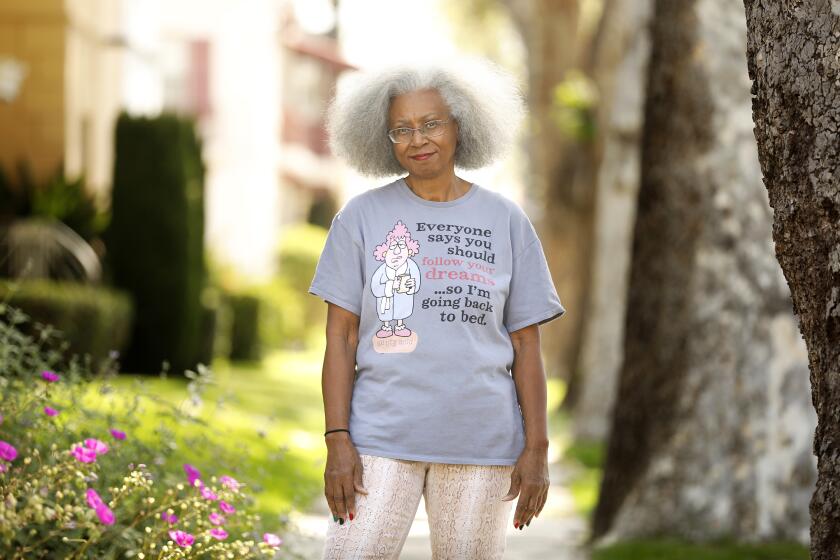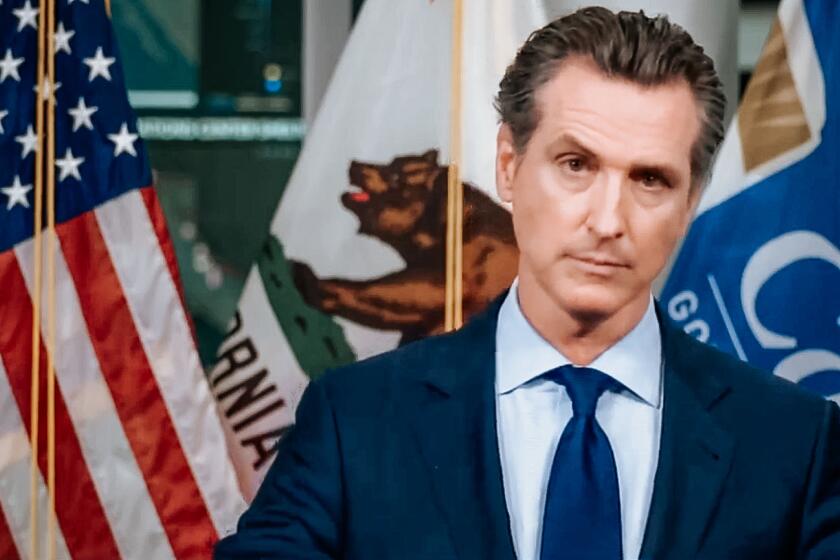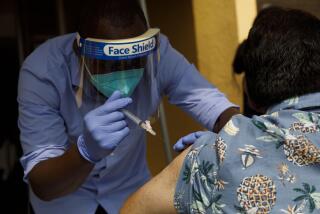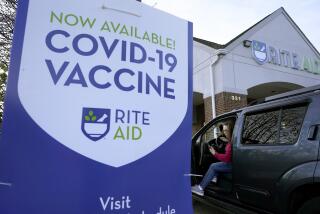Many Californians, particularly Black residents, would skip taking COVID-19 vaccine today, survey finds
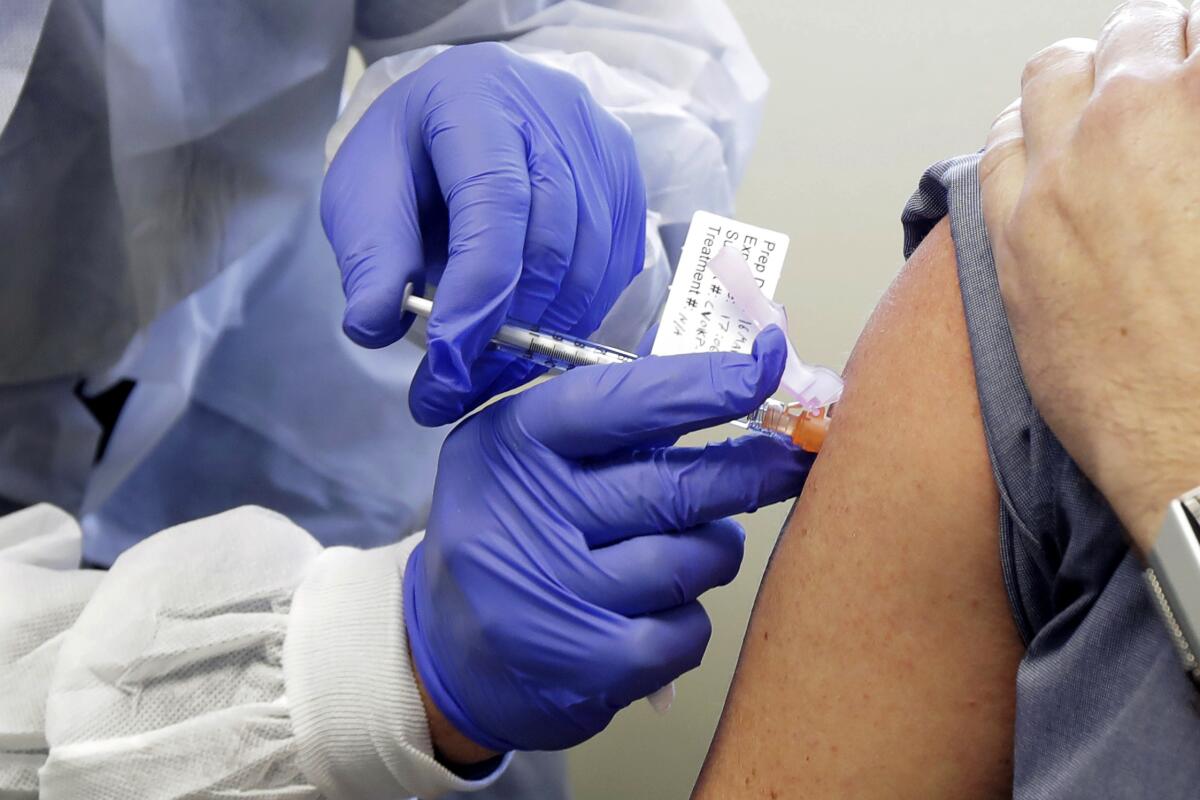
As scientists race to develop COVID-19 vaccines, a new poll shows fewer than one-third of Black residents in California plan to get immunized.
Though eye-catching and troubling for health officials developing a plan for disseminating a vaccine throughout the state, the findings of the statewide survey didnât come out of the blue.
The reluctance of Black people to get vaccinated against the virus that causes COVID-19, which has had a disproportionate impact on minorities, is rooted in a broader suspicion toward vaccines in general, according to some experts.
âI have no surprise because this is not just relevant in terms of COVID-19,â said Vickie Mays, a professor of health policy and management in the UCLA Fielding School of Public Health. âWeâve seen this even in terms of other types of immunizations.â
The poll results released Wednesday by the Public Policy Institute of California show that a majority of those surveyed, 57%, said they would either definitely or probably get a COVID-19 vaccine if it were available today.
That opinion, however, was shared by only 29% of Black respondents â far below the 70% of Asian Americans, 62% of white people and 54% of Latinos who said they would definitely or probably get vaccinated.
Instead, 44% of Black residents said they would definitely not get the vaccine were it available today.
The findings are based on a survey of 1,701 California adults who were interviewed from Oct. 9 to 18. The survey has a margin of error of plus or minus 3.5%.
The skepticism is likely driven in part by the repeated abuses and harmful practices Black Americans have been subjected to throughout history under the guise of medical research, researchers said. .
Among the most odious examples was the notorious Tuskegee experiment â in which doctors used black men in Macon County, Ala., as unwitting test subjects, withholding treatment for syphilis, even long after a cure had been found.
âSometimes the research has utilized African Americans in order to get data points, but it has not at the end of that study benefited African Americans to any extent whatever,â Mays said Thursday.
The doubts among Black respondents mirror a broader suspicion. In another poll that the Public Policy Institute of California conducted in May last year, for example, participants were asked whether parents should have to vaccinate their children for diseases like measles, mumps and rubella.
Among all adults, the response was a resounding yes â 73% to 26%. Black residents were far more split, however, with only 53% in favor of such a requirement.
With black Americans getting the coronavirus at high rates, officials are fighting a legacy of mistrust of doctors going back to the Tuskegee Experiment.
That historical distrust has deepened over time and persists today as Black people have suffered wide disparities in access to health services and worse treatment outcomes â a lasting impact of âsystemic and structural racism and inequities in the healthcare system,â according to Michelle Burton, chief strategy officer for the Los Angeles-based Community Health Councils.
âSo when people say, âWhy donât you guys come and get a COVID vaccine?â at a time when these sorts of issues around systemic racism are being countered by the current administration saying that they donât even believe that systemic racism exists, it is very difficult to engender the level of trust that you need to allow people to let you inject them with a live, active disease,â she said.
Several other factors are at play as well, experts said.
In a recent study, researchers at USC found that 31% of Black Americans would be unwilling to pay anything for a hypothetical COVID-19 vaccine â a sentiment shared by 19% of whites, 22% of Hispanics and 6% of Asian Americans.
âWhile concerns over widespread adoption of a vaccine must address questions of safety and efficacy, we have found that cost is a significant dimension as well,â they wrote in their paper earlier this month. âBeyond this, though, we find that cost does not fully account for hesitancy toward a COVID-19 vaccine, especially among Blacks.â
Another source of suspicion â one that is felt across races â is the speed with which vaccine development is moving. Its expediency is reflected in the moniker chosen by the Trump administration: Operation Warp Speed.
Overall, 68% of respondents in the recent Public Policy Institute of California poll said they were more concerned with vaccine approval moving too fast, âwithout fully establishing it is safe and effective.â Only 26% expressed greater worry with the process progressing too slowly and âcreating unnecessary delays in providing access.â
Just above three-quarters of Black respondents said they were more concerned with the vaccine approval process being too fast, compared with 73% of Asian Americans, 69% of whites and 63% of Latinos.
âWhen people talk about, âItâs going to be developed at warp speed,â people start thinking, âWait a minute, are you skipping some steps?ââ Mays said.
John Romley, a senior fellow at the USC Schaeffer Center for Health Policy and Economics and one of the paperâs authors, said that COVID-19 âis sort of becoming a perfect storm with some longstanding social problems that we have.â
Compounding the problem is that Black Americans historically have been less likely to participate in the clinical trials used to establish whether a vaccine is safe and effective, researchers wrote â a potential absence that looms especially large given the rapid push to develop a vaccine for the coronavirus.
âWhatâs really critical is, when youâre developing medication, youâre developing vaccines, if you donât have a diversity of people, part of the problem is that there might be reactions that you wouldnât expect,â Mays said.
Gov. Newsom added to concerns about COVID-19 vaccines and said the state will review the safety of any vaccine approved by the Trump administration.
The pollâs findings show that health officials, politicians and community leaders will have to work hard to assure the stateâs roughly 2.3 million Black residents that a vaccine, when ready, is safe, according to Mark Baldassare, survey director at the Public Policy Institute of California.
A key takeaway, he said Thursday, is ânot to assume that, when a vaccine is available, everyone is going to be lining up for it and lining up for it equally.â
âItâs going to be very important to provide consistent information that itâs safe and itâs ready for widespread consumption and itâs necessary â and for people to hear this from sources that they believe in and that they trust,â he said.
The recent USC study also showed how âthe pandemicâs disproportionate impact on communities of color further highlights the importance of prioritizing trust-building and transparency in the process of vaccine development and deployment.â
âWe do eventually, clearly, want to disseminate a safe vaccine to everyone and all communities,â Burton said. âBut there are going to be some real challenges, and this is one of them.â
More to Read
Sign up for Essential California
The most important California stories and recommendations in your inbox every morning.
You may occasionally receive promotional content from the Los Angeles Times.
